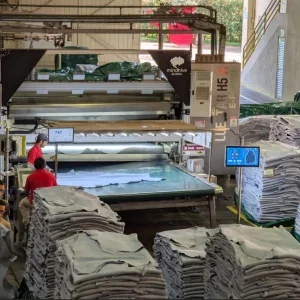Dutch fashion designer Hans Ubbink is to design clothing and accessories made from sustainable Mongolian leather.
Explaining how the project came about, Ubbink said: "During a research trip in Mongolia I saw an excess of hides from horses, sheep and cows that have grazed freely for years on the Mongolian highlands." Currently, only a quarter of the Mongolian hides available are processed into leather, and those hides that are processed are often tanned by means of outdated tanning methods.
"I want to help change this," Ubbink continued. "Therefore, I accepted an invitation to work together with Mongolian herders, tanneries and workshops in order to create sustainably produced leather clothing and accessories."
The jackets, bags, shoes and other accessories will carry the new label Aduu Mal, which signals to Dutch consumers that the goods are produced in the most sustainable manner.
Ubbink presented the first exclusive pieces at the end of March, and by next spring they will be available in limited edition in the Netherlands. The line will then be expanded in the autumn. Ubbink will design products with the Aduu Mal label for various brands, the names of which will be released later this year.
The hides that are processed into leather products originate from herds of horses (aduu in Mongolian), sheep, goats, yaks and cows (mal). These herds graze freely in the Mongolian highlands following centuries-old traditions.
Chemical company Stahl has educated Mongolian tanneries on the production of chrome-free leather and on the processing of those specific horse hides that would not have been tanned otherwise. Furthermore, any wastewater is purified and reused, and tanners, tailors and shoemakers are assured of healthy working conditions and earn fair wages.
The production chain is transparent and as sustainable as possible too.
"We will track every step of the process: from the origin of the hides, the processing of the leather, up to the production of clothing, shoes and accessories," said Ubbink. "With the Aduu Mal label you will not only know from what workshop your purchase originates, but also exactly which herd was at the foundation of your new bag, jacket or shoes."
During his trip to Mongolia, Ubbink witnessed first-hand how the Mongolian nomads coexist with sheep, cows and horses.
"It is a beautiful sight to see the herds graze in freedom," he said. Mongolian herders use virtually every component of the animal to serve them in their daily lives, such as the milk, meat, intestines and even the bones.
Due to the newest tanning methods, the excess hides that would have previously been wasted can now be processed into leather for the international market.






